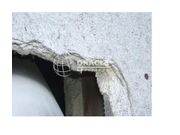Asbestos board
Description
A construction or insulating board made from Asbestos fibers mixed with consolicates, then molded under high pressure. An early absestos-containing millboard board, crocodolite (blue), was made from 1896-1965. It contained crysotile (white) asbestos in concentrations of 37-97% in a matrix of clay and starch. Later boards, such as amosite, contained 15-25% of the brown asbestos in calcium silicate. The boards tend to be brittle and broken easiliy, which can release the dangerous fibers. The boards were used for fire protection and can withstand temperatures up to about 540C (1000 F). They are typically found in service ducts, firebreaks, infill panels, partitions, walls, sidings, flooring, roof underlays and ceilings (including ceiling tiles). Since 1980, these boards were made with asbestos substitutes such as Mineral wool or glass fibers.
Synonyms and Related Terms
fibrociment (Fr.); fibrocimento (Port.); cement asbestos board; asbestos cement;
Brand names: Asbestos Air Cell; Transite; Crosicolite (blue); Amosite (brown)
Physical and Chemical Properties
- Density = 2.0 g/ml
Resources and Citations
- Oracle Solutions [website]
- G.S.Brady, Materials Handbook, McGraw-Hill Book Co., New York, 1971 Comment: p. 73
- Ralph Mayer, A Dictionary of Art Terms and Techniques, Harper and Row Publishers, New York, 1969 (also 1945 printing)
- Dictionary of Building Preservation, Ward Bucher, ed., John Wiley & Sons, Inc., New York City, 1996
- Thomas C. Jester (ed.), Twentieth-Century Building Materials, McGraw-Hill Companies, Washington DC, 1995
- Van Nostrand's Scientific Encyclopedia, Douglas M. Considine (ed.), Van Nostrand Reinhold, New York, 1976
- Art and Architecture Thesaurus Online, http://www.getty.edu/research/tools/vocabulary/aat/, J. Paul Getty Trust, Los Angeles, 2000
